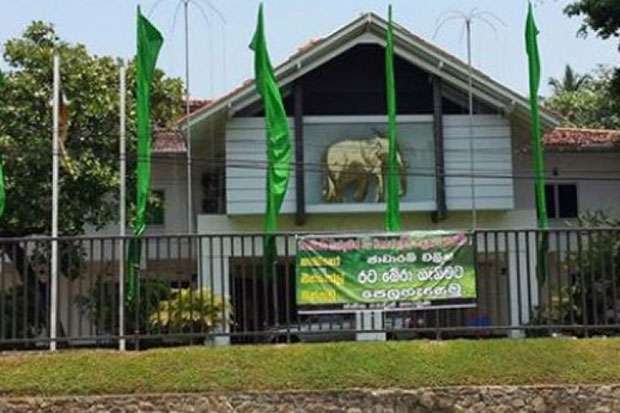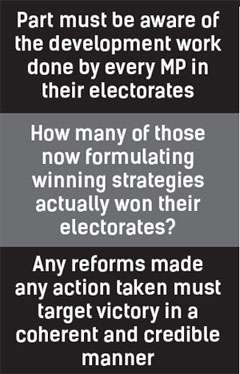11 Jun 2018 - {{hitsCtrl.values.hits}}

By Devi Samarasinghe
Every election they lose the second tier leadership, have a morning after the night before reaction and run to the media to make excuses and rationalise the reason for the loss. And always it is the leadership. Ranil must go. A new leader will be the magic panacea. There is no other reason they can find or will find for if they were to dig deeper the finger would invariably be pointing inwards. These statements are not made after consulting voters or the party rank and file for that would take a reasonable time. They are made to turn away the focus from the organisers who have failed to win their electorates. And if enough organizers start pointing fingers at the leader then they delude themselves and the public that the problem is the leader and not any failure on their part to nurture their electorates.
The first question to ask these reformists is Did they not know that the defeat was coming. Prior to February 10, most organisers were confident of victory. Take the example of Ajith P. Perera who gave an interview of how they would sweep the polls. How is it that they had no idea whatsoever of the mood of the electorate that rejected them in this manner. Is it not a clear indication of how out of touch they were with the voters. If on the other hand they knew what the outcome would be why did they not take remedial action specially by alerting the party hierarchy. When their expectations based on their misreading the electorate are not fulfilled they find an easy scapegoat in the leader and start the blame game. The truth is that they were caught napping completely out of touch with the voters. Most were elevated to the rank of minister and were busy enjoying the perks. The new cars the trips abroad and of course the side deals.
They have been too busy with all the extra to focus on the electorates. Let each MP inform the party of the list of development activities done in his/her respective electorate as well as the level of their out reach. How many UNP societies have been established and what have their programmes been. Most organizers have not even checked The electoral registers in their electorates. The Rajapaksas are masters of out reach and their wives had extensive societies that went deep into villages. What becomes more important changing who signs the cheques in Sri Kotha or reaching the grassroots?
We have to now ask how many of those now formulating winning strategies actually won their electorates? For one must get guidance on winning from a winner. Can an organizer who failed to win the electorate for the party start pontificating on how to win the country for the party?This itself demonstrates how out of touch with reality and the road to success they are. Should they not analyse what went wrong in the electorates. For example it is accepted that the failure to get flood relief to the affected caused a drop in the votes. Why did the organizers not act fast and hard to get the voters this relief. Why were no steps taken to name and shame MR-appointees who were blocking these. Shaming the leader is no problem for many in the party but shaming miscreants on public issues seems to take a backseat.
Many reformists will claim that they are accepted by a sizable number of voters and this itself is one of the main problems of the party. All candidates campaign across a district for preference votes and invariably neglect the electorate. They lose the electorate but enter parliament thanks to the preferential system. Their thinking and actions are geared to building an image across the district which employs different strategies and they are dumbfounded when they lose in a first past the post system. What is required of every organiser is that he/ she nurses electorates on a first past the post basis to ensure that the party wins across the board.
In this respect it would also be beneficial if the reforms were to include a provision that an organiser who lost the electorate three times gives up his seat even if he gets in on the preferential system. It would be futile to state that a leader must resign if the party loses if a similar provision does not apply to party organisers who are the party leaders for the electorate.
A fact that the reformists have to face is that there are many accusations of corruption against the UNPers in the past three years. Whilst there is frustration that those guilty of corruption in the past regime have not been punished voters have also watched the assets of many MPs rise and know that they are not cleaner than the last lot. Brothers who suddenly own fuel sheds, in-laws who emerge in BMWs, daughters who buy apartments, surround the MPs apart from their security and we realise that there is no real change. “Unuth ekai munuth ekai” [no difference between the predecessor and the successor] as the JVP says the reforms have to take measures to stop this rot.
Today we have a situation where a party leader who has won the district he represents and has a record for the highest number of preference votes in Sri Lanka being asked to leave by a set of MPs who have lost their electorates.That these include upstarts like Hirunika Premachandra who joined the party very recently and turncoats like Vasantha Senanayake make it imperative that the reforms include disciplinary action against MPs who break ranks.
The need for democracy in the party is another reason given for the reforms. Has there been a more feudalistic party than the SLFP under Bandaranaikes and Rajapaksas Who would dare demand reforms and leader ship changes from Mahinda? The SLFP has marched to success under a tough leader and the rot had set in once the tough leader had gone. The reforms are based on the premise that the leader is responsible for the defeat and concentrate on changing the structure to broad-base decision making but do not appear to target the elections to come. For the UNP must win presidential and general elections to govern effectively. Even If the Presidential is won it is unlikely that the UNP would form a government as without the minority votes they would not be able to get a majority and many reformists who threw the leader out would find themselves at home too realizing too late that their electorates do matter as much as their preferential votes. It is highly unlikely that even a new leader will get a outright majority in parliament and would he then have the experience and strategic capabilities of Ranil Wickremesinghe to maneoeuvre the party through to carry out a programme for the country. Have the reforms even looked that far or are they merely to give vent to the frustration of losing ?
Any reforms made any action taken must target victory in a coherent and credible manner. The reformists must have the courage to look inwards and rectify themselves to market themselves to the electorate. They must reform themselves as well for without this action on their part the reforms would be as effective as changing the paint of the Siri Kotha walls to win an election.
28 Oct 2024 1 hours ago
28 Oct 2024 2 hours ago
28 Oct 2024 2 hours ago
28 Oct 2024 3 hours ago
28 Oct 2024 3 hours ago